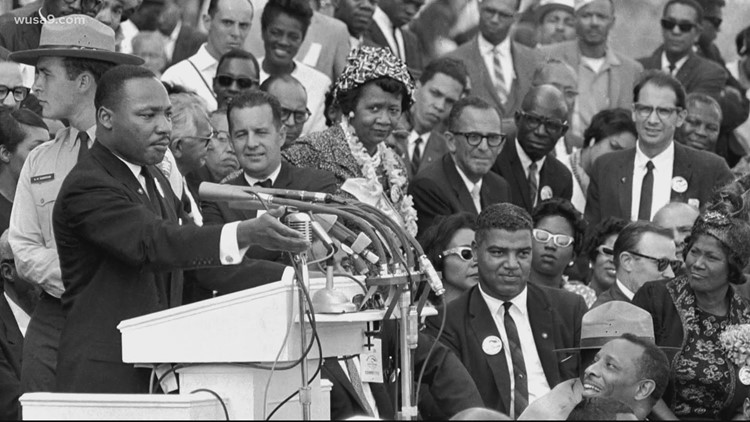WASHINGTON — This Martin Luther King Jr. Day, reflect on the life and legacy of the civil rights icon by getting to know a few facts you may have forgotten since your last history class. Here are important notes about the leader, his work and how he’s been honored since his assassination.
Early life, family and education
Dr. Martin Luther King Jr. was born on Jan. 15, 1929.
He was born in Atlanta, Georgia and was the second child of a preacher, Martin Luther King Sr., and Alberta Williams King, who was a former schoolteacher. He would ultimately become a middle child with a younger brother as well.
King grew up in the “Sweet Auburn” neighborhood of Atlanta, “Then home to some of the most prominent and prosperous African Americans in the country,” according to History.com.
He was ultimately admitted to the historically Black Morehouse College, where his grandfather and father had also attended. He studied medicine and law at school.
King graduated in 1948 and went on to earn a Bachelor of Divinity degree.
In 1953, King went on to earn a doctorate in systematic theology and met his future wife, Coretta Scott.
The couple ultimately had four children together: Yolanda Denise King, Martin Luther King III, Dexter Scott King and Bernice Albertine King.
Activism, honors
Taking his inspiration from the teachings of the church and the activism of Gandhi, King believed that change could be found in non-violent, civil disobedience.
The young family had been in Montgomery, Alabama for less than a year when the segregated city came into the spotlight due to the landmark Brown v. Board of Education decision of 1954.
Soon, King was asked to become the face of The Montgomery Bus Boycott as their spokesperson. From there, he continued to make massive strides by bravely standing up for African Americans with various nonviolent approaches, participating and encouraging others to protest inequality through boycotts, sit-ins and marches.
After his leadership in the Birmingham campaign of 1963, King was jailed and wrote his famous work, “Letter from a Birmingham Jail.”
Later in 1963, King joined other activists to organize the March on Washington, which aimed to shed light on the injustices all African Americans continued to face.
“Held on August 28 and attended by some 200,000 to 300,000 participants, the event is widely regarded as a watershed moment in the history of the American civil rights movement and a factor in the passage of the Civil Rights Act of 1964,” according to History.com.
It was on that day that the icon delivered his famous “I Have a Dream” speech while standing on the steps on the Lincoln Memorial.
He was named “Man of the Year” by TIME magazine and in 1964 and also the youngest person ever awarded the Nobel Peace Prize that year.
Michigan Democratic Rep. John Conyers introduced the first bill for a King holiday in 1968, four days after the civil rights leader was assassinated. But, the effort languished for years.
On Nov. 2, 1983, President Ronald Reagan signed into law HR3706, the final King holiday bill. Beginning in 1986, Martin Luther King Day — the first federal holiday honoring an African American — would be observed on the third Monday in January.
In 1994, President Bill Clinton signed a law designating it a National Day of Service. By 2000, all 50 states recognized it as well.
RELATED: Martin Luther King Jr. Day: Years of persistence led to holidayIn 1996, Congress authorized Martin Luther King, Jr.’s fraternity, Alpha Phi Alpha, to establish a memorial to him in Washington, D.C.
After an interview and an examination of his work in China, Master Lei Yixin became the official sculptor in 2007.
The memorial’s official dedication date is August 28, 2011, the 48th anniversary of the March on Washington.
In 2021, The Martin Luther King Jr. Memorial celebrated a decade at the National Mall and leaders from across the country, including President Joe Biden and Vice President Kamala Harris, attended the Anniversary Commemoration in October.
Backlash, ultimate assassination
As the 1950s progressed, King came into the national spotlight as a leader in organized, nonviolent resistance.
However, King’s work most certainly was not celebrated by all. White supremacists firebombed his family home in January of 1956.
On Sept. 20, 1958, a woman walked into a Harlem department store where King was signing books and stabbed him in the chest with a knife. King survived and declared that the event only propelled him forward.
King was assassinated on April 4, 1968 at age 39. He was shot dead while standing on a balcony outside his second-floor room at the Lorraine Motel in Memphis, Tennessee. He had arrived in Tennessee the day before to prepare for a march in support of striking Memphis sanitation workers.
What followed in the immediate aftermath was rioting, looting, and violence in more than 100 cities nationwide as people mourned. Thousands of people were arrested or injured. More than 40 people were reportedly killed.
James Earl Ray was eventually arrested for the murder; a fugitive who had escaped from a Missouri prison in April 1967. He pleaded guilty and was sentenced to 99 years in prison, but later recanted and spent the rest of his life claiming he was the victim of a conspiracy as he tried to get a new trial.



